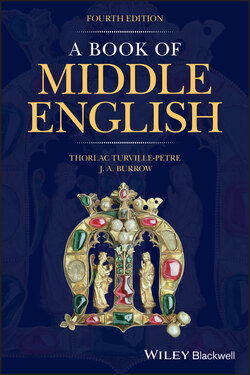Читать книгу A Book of Middle English - J. A. Burrow - Страница 71
5.6.3 Auxiliaries of the Past
ОглавлениеThe perfect, bringing past action up to the present (‘have done’, etc.) or to some point in the more recent past (‘had done’, etc.), is regularly used in Middle English: þy bone þat þou boden habbes, ‘the request that you have asked for’, 9/327; uche lede as he loved and layde had his hert, ‘each man in the way he loved and had set his heart’, 8/168. To form the perfect of intransitive verbs involving change of state, and particularly verbs of motion, the auxiliary be is generally used: he is nu suþe acoled, ‘he has now cooled off considerably’, 2/205; he watz flowen, ‘he had fled’, 8/183; when he was in þe roche ygo, ‘when he had gone into the rock’, 5/349. Be is also used with verbs meaning ‘become’ which have a noun as complement: he is bicumen hunte, ‘he has become a huntsman’, 3/114; my bapteme is worthyn, ‘has become my baptism’, 11/330.
In narrative style the perfect can be used to suggest that the consequences of an action are still developing: so long he haþ þe way ynome /To Winchester he is ycome, ‘so long has he taken the way that he has arrived at Winchester’, 5/477–8; anon þe wylde loves rage … haþ mad him …, 13/222–4. As a feature of narrative style it may alternate with the simple past tense: he mette Massynysse / That hym for joy in armes hath ynome, ‘… who took him in his arms’, 16/37–8. So narrative of past events can be told with the simple past tense, the historic present, or the perfect.
The verb ginnen (also anginnen, onginnen) originally meant ‘begin’. Its past tense gan/gune (and related forms can/con) was also frequently used with an infinitive as an equivalent of a past tense. Context generally determines which sense is appropriate; so seþþen þat ich here regni gan, 5/425, is ‘ever since I began to reign here’, whereas boþe breþes con blowe, 8/138, may be translated with a simple past tense, ‘both winds blew’. In other cases the uncertainty may be a feature of the style, creating an expectant sense of events to be recounted: þa riden agon Arður, ‘then Arthur rode’ or ‘began to ride’ (when something happened), 3/47. Considerations of metre and rhyme no doubt also play a part in this example: as sone as sche gan awake / Sche crid and loþli bere gan make, ‘as soon as she woke up she cried and made/began to make a horrible noise’, 5/77–8.
